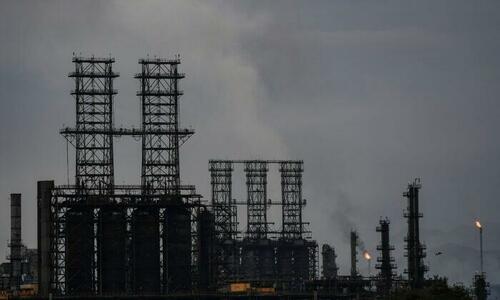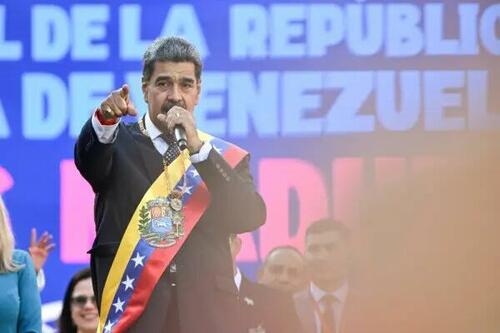Authored by Owen Evans via The Epoch Times,
President Donald Trump said on Jan. 20 that his administration would likely stop buying oil from Venezuela.
“It was a great country 20 years ago, and now it’s a mess,” Trump told reporters in the Oval Office, hours after his inauguration.
“We don’t have to buy their oil. We have plenty of oil for ourselves.”
Trump on Monday laid out a plan to maximize U.S. oil and gas production, including by declaring a national energy emergency. He also signed an executive order withdrawing the United States from the Paris Climate Accord.
Venezuela holds the largest proven crude oil reserves in the world, with more than 300 billion barrels as of the end of 2023, according to OPEC.
U.S. crude oil imports from Venezuela slumped in 2019 when the United States imposed sanctions on Venezuelan state oil company Petróleos de Venezuela.
Expanded sanctions imposed by the first Trump administration in 2019 significantly restricted Venezuela’s oil industry. The Biden administration later eased some restrictions, maintaining company-specific licenses that allowed companies such as Chevron to operate under limited conditions in Venezuela.
The United States eased sanctions in November 2022 when The Office of Foreign Assets Control, which enforces economic and trade sanctions, granted waivers to Chevron.
In April 2024, the United States reimposed oil sanctions on Venezuela over election concerns.
Venezuelan President Nicolás Maduro was sworn in on Jan. 10 after a contentious election.
Opposition leader María Corina Machado called Maduro’s inauguration a “coup d'état” and a violation of the nation’s constitution.
The Chinese Communist Party has been a supporter of Maduro. In a July 2024 statement, Chinese leader Xi Jinping said, “China will, as always, firmly support Venezuela’s efforts to safeguard sovereignty, national dignity, and social stability.”
On Jan. 15, Sen. Marco Rubio (R-Fla.), now secretary of state, said the United States should reconsider Chevron’s sanctions waiver that allows the oil company to operate.
“The Biden administration has allowed oil to flow. [Maduro] stole the election, completely violated what Biden told him he would do,” he said.
He said that Venezuela “sadly, is not governed by government.”
“It’s governed by a narco-trafficking organization that has empowered itself of a nation state. And we have seen, I believe, upwards of seven, eight, nine million Venezuelans have just left the country, more are expected to leave,” he said.
Tamas Varga, an oil analyst at PVM Oil Associates, told the Epoch Times that OPEC, with its massive spare capacity, “could easily replace lost Venezuelan barrels.”
OPEC consists of 12 member countries: Venezuela, Algeria, Congo, Equatorial Guinea, Gabon, Iran, Iraq, Kuwait, Libya, Nigeria, Saudi Arabia, and the United Arab Emirates.
Venezuelan President Nicolas Maduro speaks during the swearing-in ceremony at Palacio Federal Legislativo in Caracas, Venezuela, on Jan. 10, 2025. Alfredo Lasry R/Getty Images
Varga said that sanctions on Venezuela must be viewed through the prism of the Biden administration’s sanction package on Russia’s shadow fleet, which impacts Venezuelan exports.
On Jan. 10 the U.S. Treasury imposed sanctions on 183 vessels that have shipped Russian oil, many of which are in the so-called shadow fleet of aging tankers operated by non-Western companies.
“If reversed, Venezuelan oil will keep flowing, most likely to China and Iran,” he said.
If the sanctions stay, he said, the impact on the global oil balance will be minimal. Varga said that whether U.S. oil and gas production grows or not will be more of the “function of market economics than Trump.”
He added that if the dollar remains strong during Trump’s presidency, it will make oil more expensive in other currencies and consequently lower demand.
“When we draw a line here, we conclude that the current snapshot is unfavorable for oil prices and at the same time acknowledge that given the new president’s unpredictability, the picture could change swiftly,” Varga said.
A spokeswoman for Chevron told The Epoch Times that Chevron “conducts its business in Venezuela in compliance with all applicable laws and regulations.”
“We have been a constructive presence in Venezuela for over a century, where we have dedicated investments and a large workforce,” she said. “We remain committed to the safety and wellbeing of our employees and their families, the integrity of our joint venture assets, and the company’s social and humanitarian programs that continue to positively impact the lives of Venezuelans.”

